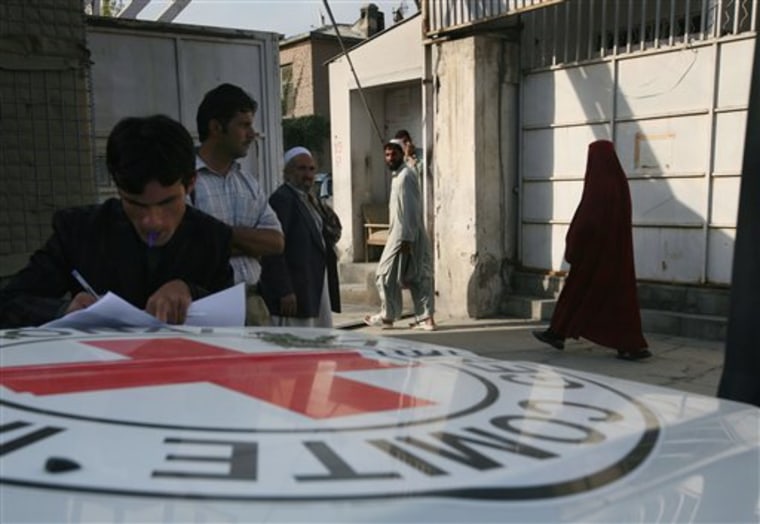Five detainees in an American military prison in Afghanistan met with their families Tuesday in the first face-to-face visits allowed since the U.S. set up the detention center six years ago, officials said.
The five families met for an hour with the prisoners inside the heavily fortified Bagram Air Base, some 30 miles north of Kabul, said the International Committee for the Red Cross, which helped broker the agreement with the U.S. to allow the visits.
"This is indeed a crucial day for many families who have not seen their relatives in a long period of time," said Greg Muller, a Red Cross delegate in Kabul.
U.S. military spokesman Capt. Scott Miller said the U.S. will now allow routine family visits at least once a week and possibly more frequently. However it was not clear whether the U.S. has agreed to allow all of the some 600 prisoners in Bagram family visits and whether they will permit more than five visits a week.
Some 20 men, women and children boarded a small bus at the Red Cross offices in Kabul for the journey to Bagram. Most of the women wore the all encompassing burqa while some of the men hid their faces. The families met the prisoners at a facility outside the prison but inside the American base.
Haji Qasim's brother Ahktar Mohammad was detained nearly three years ago in the eastern province of Khost. Like many family members of prisoners in Bagram, Qasim said his brother was detained based on wrong information provided to American troops.
Tears, then lots of talking
On Tuesday, he sat across from his older brother, a glass window separating the two. They could not hear each other well, but Qasim saw the number 2629 on Mohammad's prison uniform.
"We cried first," Qasim said. Then he said they chatted for about an hour and fifteen minutes, before Qasim and other family members were bused back to Kabul where they were given money by the Red Cross for their journey home.
The decision to allow the visits followed years of discussions between American officers and the Red Cross, which says face-to-face visits between prisoners and relatives are a guaranteed right under international humanitarian law.
"We understand the positive impact these types of programs can have on the mission here in Afghanistan, particularly in terms of detainee behavior," said Brig. Gen. James McConville, a senior U.S. military official at Bagram.
The U.S. military in Iraq already allows visits to detainees by family members. Two detention centers, one in Baghdad and one on the Kuwait border, receive an average of 13,000 visitors a month, said Maj. Neal V. Fisher II, a U.S. spokesman in Iraq. Video conference visits are also available, he said.
The Red Cross helps individuals in jails around Afghanistan and the world establish contact with their families, largely through written messages. Red Cross delegates have been visiting Bagram prison since 2002. Their reports on the conditions there are kept secret.
Video conferencing used earlier
In January, the Red Cross began helping families speak with Bagram prisoners through a video-conferencing call system. Families come to the Red Cross offices in Kabul to speak to the detainees. More than 1,500 calls were made the last eight months, the Red Cross said.
McConville said the video-conferencing has improved detainee behavior, prompting the creation of face-to-face visits.
"The videophone system was an important first step in reassuring family members that their relatives held in Bagram were alive and well, and vice versa, because it gave them the opportunity to see and speak to one another," said Franz Rauchenstein, head of the Red Cross delegation in Afghanistan.
But nothing can replace "the intensity" of in-person visits, Rauchenstein said.
"We have continued to work with the U.S. authorities to make such visits a reality, and we are very happy for the families that they now have this opportunity," he said in a statement.
